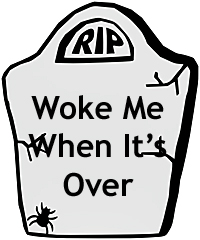 Ain’t woke. Do not disturb.
Ain’t woke. Do not disturb.
The boast of heraldry, the pomp of pow’r,
And all that beauty, all that wealth e’er gave,
Awaits alike th’ inevitable hour.
The paths of glory lead but to the grave.
Thomas Gray, “Elegy Written in a Country Churchyard”
Wellsboro, Pennsylvania, population 3,191, was founded in 1806. Had we been able to choose our birthplace, we would have chosen there; but birthplaces are like parents, you don’t get to choose ’em. You can choose your retreats, however, which brings us several times a year to Wellsboro, a settled, respectable, and quiet town ringed by the sort of mountains that would inspire a lesser writer to exclaim, “That could not have happened by accident.”
The Wellsboro Cemetery was incorporated in 1849. It supplanted a previous cemetery that had been outgrown by local residents. By the time that the new cemetery became operational in 1856, the bodies of Mary Wells and her husband, Benjamin Wistar Morris, had been moved there, along with those of many of their neighbors in the old cemetery. As Mamaw Vance said in another context, “We honor our dead.”
On a wandering ride through the “new” cemetery one spring afternoon, we realized that among the almost nine thousand tombstones there, the ones honoring a married couple, honored a heterosexual one. Of the many tombstones that we saw, none read, “Here lie Trevor and his husband, Bruce.”
Then we realized that save for the occasional Ebenezer or Clorissa, there were no what-the-fuck first names there. No Shantella or D’brickshaw or Barkevious. There were no single-mom tombstones, either, surrounded by eight or nine of their children’s tombstones. And forget trannies. No “Here lies Angelina, formerly Andrew.” Dead naming? What’s that?
“Such a restful place,” we thought, remembering another line from Gray’s 1751 poem. “Far from the madding crowd’s ignoble strife, their sober wishes never learned to stray.”
Where we live, four hours away from Wellsboro, sober wishes are too often in short supply; and ignoble strife, driven by the shrill demands of special-interest groups eager to lay all the problems of the world at the feet of white people, befouls the air.
As we left the cemetery, a sad thought intruded: Enjoy it while you can, dearly departed. Any day now a pair of lady gym teachers is gonna want to spend eternity frolicking among you. There goes the neighborhood. Can a cemetery be woke?